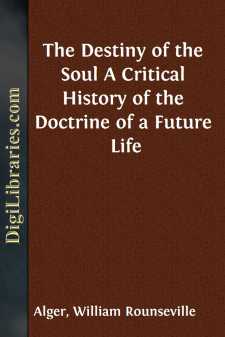Categories
- Antiques & Collectibles 13
- Architecture 36
- Art 48
- Bibles 22
- Biography & Autobiography 813
- Body, Mind & Spirit 142
- Business & Economics 28
- Children's Books 17
- Children's Fiction 14
- Computers 4
- Cooking 94
- Crafts & Hobbies 4
- Drama 346
- Education 46
- Family & Relationships 57
- Fiction 11829
- Games 19
- Gardening 17
- Health & Fitness 34
- History 1377
- House & Home 1
- Humor 147
- Juvenile Fiction 1873
- Juvenile Nonfiction 202
- Language Arts & Disciplines 88
- Law 16
- Literary Collections 686
- Literary Criticism 179
- Mathematics 13
- Medical 41
- Music 40
- Nature 179
- Non-Classifiable 1768
- Performing Arts 7
- Periodicals 1453
- Philosophy 64
- Photography 2
- Poetry 896
- Political Science 203
- Psychology 42
- Reference 154
- Religion 513
- Science 126
- Self-Help 84
- Social Science 81
- Sports & Recreation 34
- Study Aids 3
- Technology & Engineering 59
- Transportation 23
- Travel 463
- True Crime 29
William Rounseville Alger
William Rounseville Alger (1822–1905) was an American author, clergyman, and scholar known for his philosophical and religious writings. His most famous work is "The History of the Doctrine of a Future Life" (1864), which explores beliefs about the afterlife across various cultures and religions. Alger was also a prominent Unitarian minister, serving in churches in Boston and New York. Additionally, he wrote "The Poetry of the Orient" and "The Solitudes of Nature and of Man," reflecting his interest in spirituality and human introspection.
Author's Books:
Sort by:
PREFACE TO THE TENTH EDITION. THIS work has passed through nine editions, and has been out of print now for nearly a year. During the twenty years which have elapsed since it was written, the question of immortality, the faith and opinions of men and the drift of criticism and doubt concerning it, have been a subject of dominant interest to me, and have occupied a large space in my reading and...
more...
A STATEMENT of the facts in which this book began may gratify the curiosity of some of its readers. While gathering materials for a History of Friendship, I was often struck both by the small number of recorded examples of the sentiment among women, which were discovered in my researches, and by the commonness of the expressed belief, that strong natural obstacles make friendship a comparatively feeble...
more...



